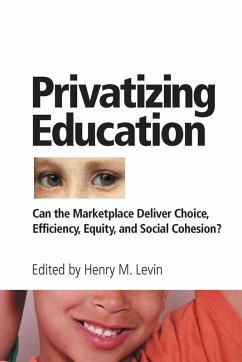Henry Levin
Privatizing Education
Can The School Marketplace Deliver Freedom Of Choice, Efficiency, Equity, And Social Cohesion?
Henry Levin
Privatizing Education
Can The School Marketplace Deliver Freedom Of Choice, Efficiency, Equity, And Social Cohesion?
- Broschiertes Buch
- Merkliste
- Auf die Merkliste
- Bewerten Bewerten
- Teilen
- Produkt teilen
- Produkterinnerung
- Produkterinnerung
An insightful and timely look at one of the hottest policy issues in education today: the initiative to move education from the public sector to the private sector.
Andere Kunden interessierten sich auch für
![Privatizing Educational Choice Privatizing Educational Choice]() Clive R BelfieldPrivatizing Educational Choice66,99 €
Clive R BelfieldPrivatizing Educational Choice66,99 €![Values in Higher Education Teaching Values in Higher Education Teaching]() Tony HarlandValues in Higher Education Teaching58,99 €
Tony HarlandValues in Higher Education Teaching58,99 €![The Future Agenda for Internationalization in Higher Education The Future Agenda for Internationalization in Higher Education]() The Future Agenda for Internationalization in Higher Education55,99 €
The Future Agenda for Internationalization in Higher Education55,99 €![The Death of Progressive Education The Death of Progressive Education]() Roy LoweThe Death of Progressive Education72,99 €
Roy LoweThe Death of Progressive Education72,99 €![Assessment and Documentation in Early Childhood Education Assessment and Documentation in Early Childhood Education]() Maarit AlasuutariAssessment and Documentation in Early Childhood Education74,99 €
Maarit AlasuutariAssessment and Documentation in Early Childhood Education74,99 €![Changing Practices of Doctoral Education Changing Practices of Doctoral Education]() David Boud / ALISON LEE (eds.)Changing Practices of Doctoral Education64,99 €
David Boud / ALISON LEE (eds.)Changing Practices of Doctoral Education64,99 €![Urban Teacher Education and Teaching Urban Teacher Education and Teaching]() Urban Teacher Education and Teaching66,99 €
Urban Teacher Education and Teaching66,99 €-
-
-
An insightful and timely look at one of the hottest policy issues in education today: the initiative to move education from the public sector to the private sector.
Hinweis: Dieser Artikel kann nur an eine deutsche Lieferadresse ausgeliefert werden.
Hinweis: Dieser Artikel kann nur an eine deutsche Lieferadresse ausgeliefert werden.
Produktdetails
- Produktdetails
- Verlag: Routledge
- Seitenzahl: 386
- Erscheinungstermin: 24. Mai 2001
- Englisch
- Abmessung: 229mm x 152mm x 21mm
- Gewicht: 558g
- ISBN-13: 9780813366401
- ISBN-10: 0813366402
- Artikelnr.: 22040984
- Herstellerkennzeichnung
- Libri GmbH
- Europaallee 1
- 36244 Bad Hersfeld
- gpsr@libri.de
- Verlag: Routledge
- Seitenzahl: 386
- Erscheinungstermin: 24. Mai 2001
- Englisch
- Abmessung: 229mm x 152mm x 21mm
- Gewicht: 558g
- ISBN-13: 9780813366401
- ISBN-10: 0813366402
- Artikelnr.: 22040984
- Herstellerkennzeichnung
- Libri GmbH
- Europaallee 1
- 36244 Bad Hersfeld
- gpsr@libri.de
Henry Levin
Introduction
Chapter 1: Studying Privatization in Education Henry M. Levin
Introduction
Setting the Agenda
Chapter 2: Educational Vouchers and The Media Lee D. Mitgang and Christopher V. Connell
The Stakes and The Stakeholders
The Medias Challenges
What Can Be Done? Implementation Issues
Chapter 3: The Legal Status of Privatization and Vouchers in Education Frank R. Kemerer
Privatization Within the Public Sector
Vouchers, Tax Deductions, and Tax Credits
Stakeholders and The Research Agenda
Summary
Chapter 4: Information and Choice in Educational Privatization Mark Schneider
Parents as Stakeholders: Choice at the Individual Level
The Benefits and Costs of Gathering Information about Public Goods
Not Everyone Needs to Be Informed: The Concept of the Marginal Consumer
The Role of Other Stakeholders in the Provision of Information
The Role of Other Levels of Government and Business as Stakeholders
Increasing Information Levels
Constructing an Internet Site for Washington, DC Schools
Stratification in the Use of Information
Setting an Agenda for Schools and Information Preschools and Higher Education
Chapter 5: Preschools and Privatization Ellen Magenheim
Introduction
Who Are the Stakeholders with an Interest in This Issue and What Are Their Interests and Concerns?
What Types of Studies Might Address These Concerns?
Conclusions
Chapter 6: Privatization in Higher Education Arthur Levine
The Major Actors
The Implications for Higher Education
Research Questions International Dimensions
Chapter 7: Privatization Through Vouchers in Developing Countries: The Cases of Chile and Colombia Martin Carnoy and Patrick J. McEwan
Introduction
Vouchers and Reform in Chile, 1980-1996
Lessons from the Chilean Voucher Plan
Targeted Vouchers in Colombia
Lessons from the Colombian Voucher Plan
Conclusions
Chapter 8: Privatization in Industrialized Countries Geoffrey Walford
Introduction
Privatization in England and Wales
Privatization Measures in the 1990s
Privatization Under Labour?
The Dutch Case
Setting the Research Agenda Charter Schools
Chapter 9: Assessing the Growth and Potential of Charter Schools Pearl Rock Kane and Christopher J. Lauricella
Charter Schools: Early History
The Charter School Concept
From Concept to Reality
Factors That Inhibit or Stimulate Charter School Growth
Charter School Demographics
Charter Schools as a Potential Reform
Chapter 10: Privatization and Charter School Reform: The Rich Get Richer Amy Stuart Wells and Janelle Scott
The Multiple Meanings of Charter School Reform and Privatization
The Intersection of Charter School Reform and Privatization
Implications and Further Research
Conclusion Perspectives of Stakeholders
Chapters 11: Vouchers, Privatization, and The Poor Gary Natriello
Framing the Issue
Major Stakeholders
Stakeholder Interests
Studies to Address the Concerns of Stakeholders
Existing Research
Final Thoughts
Chapter 12: Teachers and Privatization Caroline Hodges Persell
Who Are the Stakeholders and What are Their Concerns?
Previous Work on Privatization
Needed Research Evaluation Designs
Chapter 13: Criteria for Evaluating School Voucher Studies David E. Myers
Overview and Policy Context
Framing the Policy Question
Criteria for Evaluating School Voucher Studies
Summary of Criteria and Illustrative Report Card
Chapter 14: Designing Education Voucher Experiments: Recommendations For Researchers, Funders, and Users Fred Doolittle and Wendy Connors
Introduction
Key Policy-Related Questions
Key Research Methodology Questions
Conclusion
Chapter 1: Studying Privatization in Education Henry M. Levin
Introduction
Setting the Agenda
Chapter 2: Educational Vouchers and The Media Lee D. Mitgang and Christopher V. Connell
The Stakes and The Stakeholders
The Medias Challenges
What Can Be Done? Implementation Issues
Chapter 3: The Legal Status of Privatization and Vouchers in Education Frank R. Kemerer
Privatization Within the Public Sector
Vouchers, Tax Deductions, and Tax Credits
Stakeholders and The Research Agenda
Summary
Chapter 4: Information and Choice in Educational Privatization Mark Schneider
Parents as Stakeholders: Choice at the Individual Level
The Benefits and Costs of Gathering Information about Public Goods
Not Everyone Needs to Be Informed: The Concept of the Marginal Consumer
The Role of Other Stakeholders in the Provision of Information
The Role of Other Levels of Government and Business as Stakeholders
Increasing Information Levels
Constructing an Internet Site for Washington, DC Schools
Stratification in the Use of Information
Setting an Agenda for Schools and Information Preschools and Higher Education
Chapter 5: Preschools and Privatization Ellen Magenheim
Introduction
Who Are the Stakeholders with an Interest in This Issue and What Are Their Interests and Concerns?
What Types of Studies Might Address These Concerns?
Conclusions
Chapter 6: Privatization in Higher Education Arthur Levine
The Major Actors
The Implications for Higher Education
Research Questions International Dimensions
Chapter 7: Privatization Through Vouchers in Developing Countries: The Cases of Chile and Colombia Martin Carnoy and Patrick J. McEwan
Introduction
Vouchers and Reform in Chile, 1980-1996
Lessons from the Chilean Voucher Plan
Targeted Vouchers in Colombia
Lessons from the Colombian Voucher Plan
Conclusions
Chapter 8: Privatization in Industrialized Countries Geoffrey Walford
Introduction
Privatization in England and Wales
Privatization Measures in the 1990s
Privatization Under Labour?
The Dutch Case
Setting the Research Agenda Charter Schools
Chapter 9: Assessing the Growth and Potential of Charter Schools Pearl Rock Kane and Christopher J. Lauricella
Charter Schools: Early History
The Charter School Concept
From Concept to Reality
Factors That Inhibit or Stimulate Charter School Growth
Charter School Demographics
Charter Schools as a Potential Reform
Chapter 10: Privatization and Charter School Reform: The Rich Get Richer Amy Stuart Wells and Janelle Scott
The Multiple Meanings of Charter School Reform and Privatization
The Intersection of Charter School Reform and Privatization
Implications and Further Research
Conclusion Perspectives of Stakeholders
Chapters 11: Vouchers, Privatization, and The Poor Gary Natriello
Framing the Issue
Major Stakeholders
Stakeholder Interests
Studies to Address the Concerns of Stakeholders
Existing Research
Final Thoughts
Chapter 12: Teachers and Privatization Caroline Hodges Persell
Who Are the Stakeholders and What are Their Concerns?
Previous Work on Privatization
Needed Research Evaluation Designs
Chapter 13: Criteria for Evaluating School Voucher Studies David E. Myers
Overview and Policy Context
Framing the Policy Question
Criteria for Evaluating School Voucher Studies
Summary of Criteria and Illustrative Report Card
Chapter 14: Designing Education Voucher Experiments: Recommendations For Researchers, Funders, and Users Fred Doolittle and Wendy Connors
Introduction
Key Policy-Related Questions
Key Research Methodology Questions
Conclusion
Introduction
Chapter 1: Studying Privatization in Education Henry M. Levin
Introduction
Setting the Agenda
Chapter 2: Educational Vouchers and The Media Lee D. Mitgang and Christopher V. Connell
The Stakes and The Stakeholders
The Medias Challenges
What Can Be Done? Implementation Issues
Chapter 3: The Legal Status of Privatization and Vouchers in Education Frank R. Kemerer
Privatization Within the Public Sector
Vouchers, Tax Deductions, and Tax Credits
Stakeholders and The Research Agenda
Summary
Chapter 4: Information and Choice in Educational Privatization Mark Schneider
Parents as Stakeholders: Choice at the Individual Level
The Benefits and Costs of Gathering Information about Public Goods
Not Everyone Needs to Be Informed: The Concept of the Marginal Consumer
The Role of Other Stakeholders in the Provision of Information
The Role of Other Levels of Government and Business as Stakeholders
Increasing Information Levels
Constructing an Internet Site for Washington, DC Schools
Stratification in the Use of Information
Setting an Agenda for Schools and Information Preschools and Higher Education
Chapter 5: Preschools and Privatization Ellen Magenheim
Introduction
Who Are the Stakeholders with an Interest in This Issue and What Are Their Interests and Concerns?
What Types of Studies Might Address These Concerns?
Conclusions
Chapter 6: Privatization in Higher Education Arthur Levine
The Major Actors
The Implications for Higher Education
Research Questions International Dimensions
Chapter 7: Privatization Through Vouchers in Developing Countries: The Cases of Chile and Colombia Martin Carnoy and Patrick J. McEwan
Introduction
Vouchers and Reform in Chile, 1980-1996
Lessons from the Chilean Voucher Plan
Targeted Vouchers in Colombia
Lessons from the Colombian Voucher Plan
Conclusions
Chapter 8: Privatization in Industrialized Countries Geoffrey Walford
Introduction
Privatization in England and Wales
Privatization Measures in the 1990s
Privatization Under Labour?
The Dutch Case
Setting the Research Agenda Charter Schools
Chapter 9: Assessing the Growth and Potential of Charter Schools Pearl Rock Kane and Christopher J. Lauricella
Charter Schools: Early History
The Charter School Concept
From Concept to Reality
Factors That Inhibit or Stimulate Charter School Growth
Charter School Demographics
Charter Schools as a Potential Reform
Chapter 10: Privatization and Charter School Reform: The Rich Get Richer Amy Stuart Wells and Janelle Scott
The Multiple Meanings of Charter School Reform and Privatization
The Intersection of Charter School Reform and Privatization
Implications and Further Research
Conclusion Perspectives of Stakeholders
Chapters 11: Vouchers, Privatization, and The Poor Gary Natriello
Framing the Issue
Major Stakeholders
Stakeholder Interests
Studies to Address the Concerns of Stakeholders
Existing Research
Final Thoughts
Chapter 12: Teachers and Privatization Caroline Hodges Persell
Who Are the Stakeholders and What are Their Concerns?
Previous Work on Privatization
Needed Research Evaluation Designs
Chapter 13: Criteria for Evaluating School Voucher Studies David E. Myers
Overview and Policy Context
Framing the Policy Question
Criteria for Evaluating School Voucher Studies
Summary of Criteria and Illustrative Report Card
Chapter 14: Designing Education Voucher Experiments: Recommendations For Researchers, Funders, and Users Fred Doolittle and Wendy Connors
Introduction
Key Policy-Related Questions
Key Research Methodology Questions
Conclusion
Chapter 1: Studying Privatization in Education Henry M. Levin
Introduction
Setting the Agenda
Chapter 2: Educational Vouchers and The Media Lee D. Mitgang and Christopher V. Connell
The Stakes and The Stakeholders
The Medias Challenges
What Can Be Done? Implementation Issues
Chapter 3: The Legal Status of Privatization and Vouchers in Education Frank R. Kemerer
Privatization Within the Public Sector
Vouchers, Tax Deductions, and Tax Credits
Stakeholders and The Research Agenda
Summary
Chapter 4: Information and Choice in Educational Privatization Mark Schneider
Parents as Stakeholders: Choice at the Individual Level
The Benefits and Costs of Gathering Information about Public Goods
Not Everyone Needs to Be Informed: The Concept of the Marginal Consumer
The Role of Other Stakeholders in the Provision of Information
The Role of Other Levels of Government and Business as Stakeholders
Increasing Information Levels
Constructing an Internet Site for Washington, DC Schools
Stratification in the Use of Information
Setting an Agenda for Schools and Information Preschools and Higher Education
Chapter 5: Preschools and Privatization Ellen Magenheim
Introduction
Who Are the Stakeholders with an Interest in This Issue and What Are Their Interests and Concerns?
What Types of Studies Might Address These Concerns?
Conclusions
Chapter 6: Privatization in Higher Education Arthur Levine
The Major Actors
The Implications for Higher Education
Research Questions International Dimensions
Chapter 7: Privatization Through Vouchers in Developing Countries: The Cases of Chile and Colombia Martin Carnoy and Patrick J. McEwan
Introduction
Vouchers and Reform in Chile, 1980-1996
Lessons from the Chilean Voucher Plan
Targeted Vouchers in Colombia
Lessons from the Colombian Voucher Plan
Conclusions
Chapter 8: Privatization in Industrialized Countries Geoffrey Walford
Introduction
Privatization in England and Wales
Privatization Measures in the 1990s
Privatization Under Labour?
The Dutch Case
Setting the Research Agenda Charter Schools
Chapter 9: Assessing the Growth and Potential of Charter Schools Pearl Rock Kane and Christopher J. Lauricella
Charter Schools: Early History
The Charter School Concept
From Concept to Reality
Factors That Inhibit or Stimulate Charter School Growth
Charter School Demographics
Charter Schools as a Potential Reform
Chapter 10: Privatization and Charter School Reform: The Rich Get Richer Amy Stuart Wells and Janelle Scott
The Multiple Meanings of Charter School Reform and Privatization
The Intersection of Charter School Reform and Privatization
Implications and Further Research
Conclusion Perspectives of Stakeholders
Chapters 11: Vouchers, Privatization, and The Poor Gary Natriello
Framing the Issue
Major Stakeholders
Stakeholder Interests
Studies to Address the Concerns of Stakeholders
Existing Research
Final Thoughts
Chapter 12: Teachers and Privatization Caroline Hodges Persell
Who Are the Stakeholders and What are Their Concerns?
Previous Work on Privatization
Needed Research Evaluation Designs
Chapter 13: Criteria for Evaluating School Voucher Studies David E. Myers
Overview and Policy Context
Framing the Policy Question
Criteria for Evaluating School Voucher Studies
Summary of Criteria and Illustrative Report Card
Chapter 14: Designing Education Voucher Experiments: Recommendations For Researchers, Funders, and Users Fred Doolittle and Wendy Connors
Introduction
Key Policy-Related Questions
Key Research Methodology Questions
Conclusion








